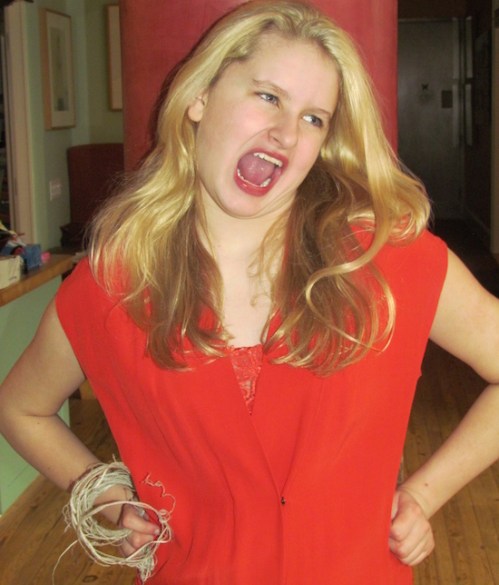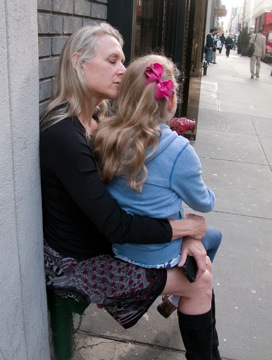Friday evening I asked Emma whether she wanted to use the laminated letter board or a qwerty, bluetooth keyboard connected to the iPad. She told me she wanted to write using the keyboard. Emma has written on the keyboard during her RPM sessions with B., but this is not something I’ve attempted. I have been reluctant to use the keyboard because Emma has done so well using the laminated letter board with me and I’m always worried about changing something that’s working well. But when using the letter board I have to transcribe as she writes or hope that I’ll remember what she’s written, whereas with the keyboard it automatically types directly onto a document within the iPad. Often I can’t remember what she’s written, or think I have remembered correctly, only to find out later I did not.
This was the case Wednesday night when Emma wrote in front of an audience at CoNGO. I hadn’t stopped to transcribe her words as she wrote them, thinking I’d be able to remember, but once she’d finished the sentence, I couldn’t remember. Afterward, when we thought we hadn’t recorded our presentation, I tried to remember what I thought she’d said – “Autism is not what parents want to hear, but I hope that will change as more people meet someone like me.” What she actually wrote, once we found the video recording, I was disconcerted to learn, was – “Autism is not what parents want to hear, but I hope that will change as more people get to know someone like me.” That is a subtle, yet significant difference. I’m so sorry Emma for getting your words wrong.
Our goal has always been for Emma to write on a keyboard and eventually be able to write with the keyboard resting on the table, so that no one need hold it. That she wrote both Friday evening and over the weekend on the keyboard is a huge leap forward and very exciting!!
So. Friday evening Richard asked Emma for permission to ask her a few questions about thinking. Now for those of you who know Richard, you will smile as you know this topic is one of his favorites. He loves nothing more than to read and discuss thinking, consciousness, dreams, reality, and anything remotely related. These are the topics Richard explores in his writing and the things he is fascinated with. Richard wrote on Emma’s Hope Book FaceBook page – I “think” of “thinking” as my constantly chattering internal dialog. I have long suspected that Emma has either NO internal dialog, or very little, and that what she “thinks” of as “thinking” must be very different from what I “think.”
Emma generously agreed to allow her dad to ask her a few questions though she did remind him that she had the timer on.
*I need to interject here that the following conversation is representative of Richard’s “thinking” and Emma’s as she describes it. No one is suggesting that ALL people, either autistic or non autistic think as either of them do. It would be a mistake to assume Richard is somehow representative of ALL non autistic people, though many may relate, or that Emma is representative of ALL Autistic people.
Richard: Mom and I have this internal dialog going on all the time and that’s what we call “thinking”. How does this differ from the way you think?
Emma: I only think in voices when I am working with you (Ariane).
Ariane: Is this also true when you write with others?
Emma: Yes.
Richard: Do you see our internal dialog as an advantage or disadvantage compared to your own way of thinking?
Emma: It is more distracting than the way I think.
Richard: Tell us more about how you think. If it’s not with an internal dialogue, what is it like?
Emma: Know that I am almost always happy and take great pleasure in sounds, color, fabric. Everything in life is beautiful if you are able to be here.
*Whoa! “Everything in life is beautiful if you are able to be here.”
Richard: I’m so used to thinking with an internal dialogue. It’s hard to imagine thinking without talking to myself.
Emma: Have you felt this always?
Richard: When I was a kid I didn’t talk to myself all the time. I was probably a lot happier. As I grew older, my internal dialog became stronger and now it’s there most of the time. I have to meditate or concentrate to temper it.
Emma: It’s too bad that you have difficulty.
Richard and I looked at each other and shook our heads in amazement. Then Emma began to laugh and we joined her.
*The keyboard we are using is a Kensington Keyboard.
**A brief update on Emma and Ari Ne’eman’s presentation at CoNGO last week that we video taped, thought we hadn’t then found we had. We have not had time to upload it and we haven’t received approval from Ari yet, so it may take a few more days before we can post all or part of it here. Bear with us.

Emma types on a qwerty keyboard







